How to Properly Store Bottled Water or Water Containers
Keeping Bottled Water On Hand
Published on January 30, 2014. Mary McShane, All Rights Reserved
When shopping for cases of bottled water, consumers often buy three or more cases of bottled water a time because they only make one trip to the store every few weeks.
Many consumers think they are safely storing bottled water in their homes and in their vehicles (cars, SUV's and motor homes) including the water they stockpile for use should a State of Emergency be called in their region.
While many families don't store water for emergencies and only buy what they will consume per week, our family does buy it in quantity because we often have a need for it due to where we live. My sisters and I are spread all over the East coast where we seem to get hit with more State of Emergency events than most places. It is not unusual for any of us to have six or more cases of water on hand.
The reason I mention this is to point out that the place you store your water is just as important as the containers in which it is sold.
If you refill containers with water, only recycling codes #3 and #7 contain harmful BPA.

Bottled Water On Display In Stores
Water on display at stores like your local supermarket, Walmart supercenters, and membership stores like Sam's Club, BJ's Warehouse, and Costco, where it sits on skids in the hot sun or in greenhouse type buildings is exposing it to changes in the temperature throughout the day. These stores typically do not bring the water indoors overnight, so that at nightfall the temperature has changed yet again inside the bottles.
If bottled water goes through temperature changes while in transport to the store, while on display in stores or in your storage area, the water becomes contaminated in the bottles depending on the type of water container.
When you thought you were putting healthy water in your body, you were in fact drinking contaminated water in many instances.
Just as there are warnings to not cook food in plasticware in the microwave, consumers need to be aware that BPA (bisphenol-A) can leach out of any plastics when exposed to temperature changes, mainly heat.
The following video points out the appearance of water on display at a store in less than desirable conditions.
Would you buy HOT water?
Urban Legend (False Information)
Not all information on websites is current, so that outdated information can also be false. But visitors don't know that when they arrive at a website looking for answers to their questions. Here is an example.
WebMD addresses the question whether bottled water which has gone through temperature changes is contaminated or not.
Many people who visit their website consider WebMD their "go to" authority for up to date medical information. I know I consult the website at least once a week for various topics.
What many people do not know is how to tell if the website's information is current.
On the following link, here's what to look for:
http://www.webmd.com/food-recipes/news/20081107/bottled-water-faq-on-safety-and-purity?page=4
Their page addressing bottled water is dated November 7, 2008 as seen in the URL. The date appears after the word "news" and the slash. Also the copyright date on the page is not updated; it states 2008.
The EPA has since updated their standing on temperature changes in bottled water to refute the following statement as not truthful. This "recent news release" from an associate professor at Johns Hopkins Center for Water and Health is on WebMD 's website in response to bottled water rumors circulating on the internet that freezing bottled water leads to contamination with carcinogenic dioxins.
I include it for your information to consider it as part of the whole picture. With emphasis added, this "recent news release" reads in part:
"Rolf Halden, PhD, PE, who is an adjunct associate professor with the Johns Hopkins Center for Water and Health, said that freezing bottled water leads to contamination with carcinogenic dioxins is nothing more than "urban legend." He notes that there are no dioxins in plastics and that freezing actually slows or prevents the release of chemicals. The industry group representing single-use beverage bottle manufacturers, known as NAPCOR also used the term "urban legend" to describe claims that it is unsafe to drink water that has been left in a hot car. 'The idea that (these) bottles 'leach' chemicals when heated in hot cars is not based on any science, and is unsubstantiated by any credible evidence,' the group noted in a recent news release. "This allegation has been perpetuated by emails until it has become an urban legend, but it just isn't so." - end of quote.
As you can see, it is not a "recent news release."
We have since learned more about the safety of bottling containers when the bottling industry was been brought more into compliance because of the implementation of the recycling codes on containers as shown in the following photo.
Safe recycling codes to look for on containers

Whenever possible, cook in glass or corningware
Reverse Osmosis & Long Term Water Storage
In Florida, our water is so highly treated that in many cities even everyday water has to be purified before use. Water is also more expensive here than, for example, in northeast states. For a state bordered on 3 sides by water, we pay very high rates for residential water that many agree doesn't even taste good.
A good number of people who have homes in Florida are residents of other states and only live here part time for the winter months. Florida residents affectionately referred to them as "snowbirds."
Because they only live here from November to around March, they store water so it will be on hand when they arrive for the winter season. Therefore it sits all spring, summer and fall when the temperatures vary greatly.
For the most part, each home has an outdoor shed or garage attached to the home and because of space constraints, it is where items are stored that are not needed for everyday use. Water stored in these outdoor areas is not the optimal place because of temperature changes.
Because the tap water is not pleasant, many residents have installed water purification systems in their homes, which uses a variety of chemicals to make the water palatable to drink and softens it so shampooing and showering are not so harsh. The Culligan Water Softening Company does a heck of a business here because they offer consumers contracts for convenience so the water is always treated. The company services the home units twice a year so it is always pure. This is a boon to snowbirds who are only residents four to five months out of the year.
Since we don't care for chemical use in our water, we use a reverse osmosis system because it purifies the water without using chemicals, unlike commercial water softening systems like Culligan. We think it is the most cost effective over time. We keep filled water containers in refrigerator and pantry because we never know when the water will suddenly not be available from the faucet or become contaminated after rainfall or storms.
Water obtained through reverse osmosis systems stores the water without the added chemicals of water softening systems like Culligan. Therefore it can be stored for longer periods of time.
The next video explains how much water is ideal to have on hand for emergency use.
The second video explains how to treat and store large quantities of water. We use this method to treat and store our reverse osmosis water for emergency use.
© Mary McShane
How To Properly Store Bottle Water & Containers
If you find the advertisements on the videos annoying, click the X on the advertisement only, not on the video.
Important Directions - How To Treat Water: 1 teaspoon bleach to 5 gallons of water
Opinion Poll
Do you store your bottled water in safe environments, away from temperature changes?

© 2014 Mary McShane



